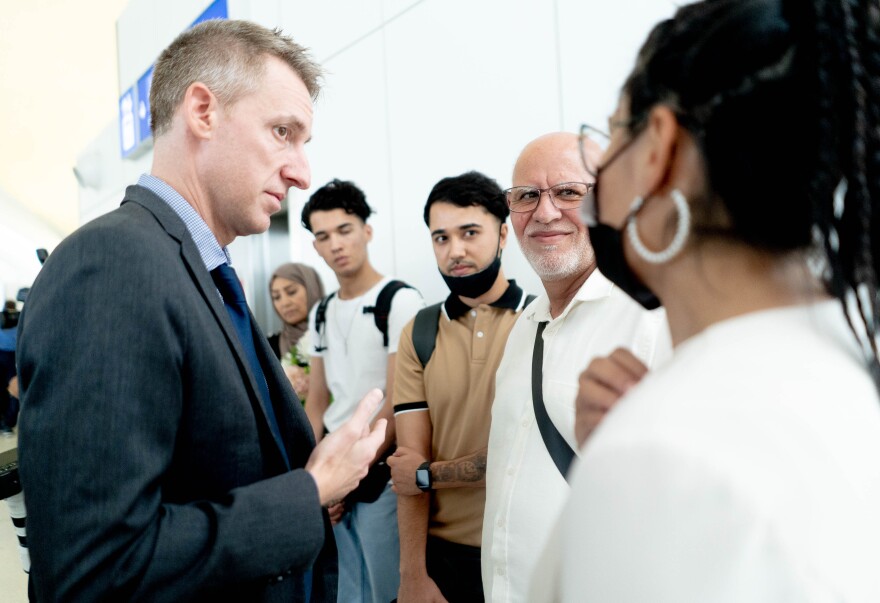Advocates for an Afghan refugee family that arrived Monday at St. Louis International Airport say they hope that hundreds of other Afghans stuck in the Balkan peninsula will soon arrive in the region.
Business leaders, immigration activists and Missouri politicians are urging the federal government to issue visas to 380 more refugees who fled Afghanistan in 2021 and are now stranded in Albania, a small country on the Balkan Peninsula.
“These are not just people waiting to find out whether they can come in,” said former Missouri Secretary of State Jason Kander, an Army veteran who served in Afghanistan. “There’s a whole community here waiting to find out if they’re going to receive them. These people are already St. Louisans, as far as the people here are concerned. And we want to get them all here.”
Four members of the Azimi family arrived in St. Louis on Monday afternoon. They’re part of a group of Afghan refugees in Albania. The group is made up of those who assisted U.S. forces during the war in Afghanistan and their families.
Kander is one of the organizers of the veteran-led organization Afghan Rescue Project, which helped the group flee their homeland in 2021 when American troops left the country and the Taliban government took over. Because members of the group had assisted the United States military, they feared they would face persecution from the new regime.
The group fled to Albania and is now waiting for federal officials to issue visas that would allow them to come to the United States, but bureaucratic tie-ups have stranded the refugees for close to a year, lawyers working with the organization said. The Azimi family was able to get to the country because one member needed medical care.
The family is looking forward to being part of the St. Louis community, said Mr. Azimi, whose comments were translated by Moji Sidiqi, a program manager for the International Institute in St. Louis.
“I don't know anybody in St. Louis besides the couple of folks,” Azimi said. “But what he has heard from the internet, and what he has seen, is that St. Louis has a welcoming culturefor the refugees, and he wants to be a part of it.”
Advocates have secured an apartment that Azimi, his wife, and two sons are moving into this week.
The Afghans in Albania have said they are ready to move to St. Louis, Kander said, and local officials including St. Louis Mayor Tishaura Jones and U.S. Rep. Cori Bush have voiced their support for bringing them to the region.
“Today sends a message to the whole world and especially this country,” Jones said during a news conference Monday at the airport. “Refugees are welcome in St. Louis.”
Kander, Bush, Jones and others at the conference said they hoped the show of support would spur federal officials to issue visas to the group.
The International Institute already has welcomed 700 Afghan refugees and is working with lawyer Jerry Schlichter to fund an Afghan newspaper and chamber of commerce to welcome new immigrants from the country.
They hope immigrants could boost the area’s flagging population and reinvigorate neighborhoods in the way the influx of Bosnian refugees revitalized south St. Louis in the 1990s, said Jason Hall, CEO of the business organization Greater St. Louis Inc.
“We have got to grow in this region,” he said, “which means you cannot say loud enough or often enough that refugees and immigrants are welcome in the St. Louis community.”
Follow Sarah on Twitter: @petit_smudge






![St. Louis Mayor Tishaura Jones said the region will welcome 1,000 or more people fleeing Afghanistan after they endangered themselves by supporting U.S. forces there. [8/19/21]](https://npr.brightspotcdn.com/dims4/default/85b89b3/2147483647/strip/true/crop/3428x2268+0+0/resize/130x86!/quality/90/?url=http%3A%2F%2Fnpr-brightspot.s3.amazonaws.com%2F1a%2F90%2Fa60fcb7a44339851e315425f32d7%2F081921-agfhanrefugees-jdg-01.jpg)
